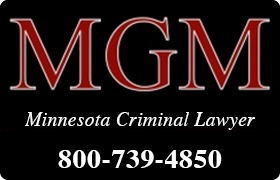Saint Paul Criminal Lawyer, Minnesota
Sponsored Law Firm
-
 x
x

Click For More Info:
-
MGM Law Office
11436 Marketplace Drive North, #322 Champlin, MN 55316 » view mapCriminal Defense, DUI, Expungement, more... Helping Clients Manage Risk | Call Now
MGM Law Office is prepared to understand the unique facts of your case and assist you in your defense. We can assist you with all of your criminal defense matters.
800-739-4850  Michael Martin Champlin, MN
Michael Martin Champlin, MNAttorney At Law - Minnesota
William Mitchell College of Law, 2009
 Case Results
Case ResultsMGM Law Office assists clients with personal, detailed attention to understand your unique situation.
Omeed Esmil Berenjian
Omeed Berenjian is the co-founder of BK Law Group as well as a dedicated attorney for the firm. With more than twelve years of experience, Omeed helps... (more)
Michael G. Martin
✓ VERIFIEDManaging risk in today’s world can be difficult. MGM Law Office is prepared to assist clients in making these risks more manageable. MGM Law Offic... (more)
Rich Hechter
✓ VERIFIEDRichard Hechter is a family law, personal injury, and medical malpractice attorney for Morris Law Group. RIch is an accomplished and skilled litigator... (more)
Vincent Martin
✓ VERIFIEDVincent P. Martin heads the Immigration Practice Group at Martin Law. As an immigrant himself, he has a personal appreciation for both the benefits of... (more)
Elliott John Nickell
✓ VERIFIEDNickell Law Firm was founded in 2014 with a mission to provide the best client service to criminal defendants and personal injury clients. We stri... (more)
Travis C. Thompson
✓ VERIFIEDEstablished in 2009, Thompson Law, LLC provides affordable and experienced legal counsel in the practice areas listed above. Thompson Law attorneys... (more)
Kelli Ann Gaborsky
✓ VERIFIEDAs your attorney it is my goal to be your advocate through the complex and fearful legal process. During this time you expect your attorney to be an a... (more)
Jonathan Kim Reppe
✓ VERIFIEDMr. Reppe developed a passion for helping individuals with their legal problems while working as a public defender early in his career. He moved on to... (more)
Lance R Heisler
✓ VERIFIEDLance R Heisler is a practicing lawyer in the state of Minnesota handling bankruptcy matters.
John Elijah Roach
✓ VERIFIEDJohn Roach has focused his career on assisting clients involved in complex family law and landlord-tenant disputes. From parents involved in child cus... (more)


 Michael Martin Champlin, MN
Michael Martin Champlin, MN Case Results
Case Results










